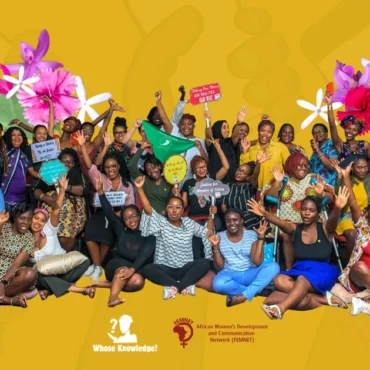Caste, tech and resistance resource list
Our resource list about caste, tech and resistance is a collection of different ways caste-oppressed people navigate the Internet, and resist discrimination on, and offline.
Decolonizing the Internet: East Africa podcast e-zine
This podcast series was borne from the feminist fires lit in Lusaka and deepens these conversations in a fun, informal and engaging way. Use our e-zine as an audio and text guide through the DTI-EA podcast season.
Download
Solidarity with Palestine: reading and resource list
A non-exhaustive list of readings, podcast episodes, videos, profiles to follow, and other resources in support of the Palestinian struggle.
Deep diving into Decolonizing Structured Data – Summary report
In August 2023, we invited over 30 participants for conversations on decolonizing the Internet’s structured data, ahead of Wikimania 2023 in Singapore. This report is a snapshot of the provocations, reflections, and happy speculations that emerged from our collective thinking about structured data.
Download
Public Domain Learning Circle stickers
Some stickers to print out about the Public Domain and Liberatory Archives and Memory.
Deep dive into Decolonizing Structured Data resource list
Ever wanted to find out more about the basics of structured data, or how to understand it from an anti-oppressions lens? This reading list is for you.
Download
What would it be then, a plural public domain?
Welcome to a public reading list and glossary about the Public Domain and related themes started by Whose Knowledge?.
Decolonizing the Internet East Africa
In September 2022, the African Women's Development and Communication Network (FEMNET) and Whose Knowledge?, convened nearly 40 feminists working in tech from across the East-African region in Lusaka, Zambia, to hold conversations and reflections on decolonizing the internet. In this report we share experiences and collective strategies from this gathering.
Download
Decolonizing the Internet’s Structured Data – Summary Report
In October 2021, we invited over 40 participants from around the world for the conversation Decolonizing the Internet’s Structured Data.Together with amazing panelists and participants, we examined whose views, whose agenda, whose ontologies (categories of classification), and whose decisions build and sustain these classifications and systems. Read the report back from this gathering.
State of the Internet’s Languages Report
The internet we know is not even close to being as multilingual and multimodal as we are in physical, embodied, life. To be multilingual is to honor and affirm the full richness and textures of our many selves and our different worlds better. But what would a truly multilingual and multimodal internet look, feel, and sound like?










